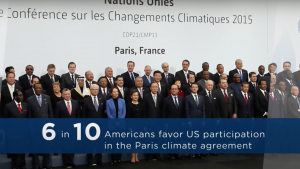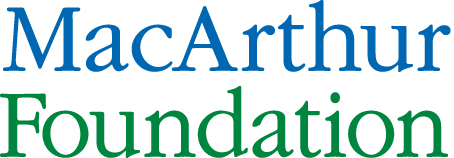President Trump’s skepticism on climate change and decision to withdraw from the Paris Climate Agreement is out of step with the American public overall.
On June 1, 2017, President Donald Trump announced his intent to withdraw the United States from the Paris climate agreement, noting that he was "elected to represent the citizens of Pittsburgh, not Paris." This withdrawal was a long-standing campaign promise, and an integral part of his America First platform. President Trump’s skepticism on climate change and decision on the Paris Agreement may align with select groups of Republicans, but it is out of step with the American public overall.
Americans Want In, Trump Wants Out
The 2017 Chicago Council Survey—conducted just after President Trump announced his intention to withdraw from the Paris Agreement—finds that the American public continues to disagree with the president’s decision (though at lower rates than in 2016). A clear majority of Americans (62%) favor participation compared to 71 percent a year ago. But partisan divides are noticeable: majorities of Democrats (73%, down from 87% in 2016) and Independents (58%, down from 68%) favor US participation compared to just 37 percent of Republicans (down from 57% in 2016).
There is also a distinct split within the Republican Party on participation in the Paris Agreement. While only 23 percent of Trump Republicans—those with a very favorable view of Donald Trump—support participation, a narrow majority of non-Trump Republicans favor US participation.
Republican Party Split on Paris Agreement
Based on what you know, do you think the United States should or should not participate in the Paris Climate Agreement?
Source: 2017 Chicago Council Survey
Other polling shows that the American public anticipates long-term effects for the United States from withdrawing from the Paris Agreement. An AP/NORC survey conducted in June 2017 found 52 percent saying that withdrawing would hurt the national economy in the long run. An ABC News/Washington Post poll showed that slightly more Americans believe that withdrawing from the agreement would cost US jobs (47%) than create jobs (39%). Similarly, more said it would hurt the US economy (42%) than help (32%). And a majority (55%) said it would hurt US leadership in the world versus 18 percent that said it would help.
Threat of Climate Change Keeps Climbing
A growing percentage of the American public cites climate change as a critical threat to the United States compared to previous polls. Forty-six percent say climate change is a critical threat—the highest percentage since the question was first asked in 2008, and up 7 percentage points from 2016.
On this question, too, there are partisan differences. Seven in 10 Democrats (69%) view climate change as a critical threat, with only 16 percent of Republicans overall, 23% of non-Trump Republicans, and 9 percent of Trump Republicans sharing that view. The divide between Republicans and Democrats is at a record high since the question was first asked in 2008, growing from a 39 percentage point gap in 2008 to 53 percentage points in 2017.
Partisan Discord on Climate Change as a Critical Threat
Do you see climate change as a critical threat, an important but not critical threat, or not an important threat at all?
Republican Party Discord on Climate Change as a Critical Threat
Do you see climate change as a critical threat, an important but not critical threat, or not an important threat at all?
Source: 2017 Chicago Council Survey
Increased concern about climate change may be tied to a perception that severe weather events are on the rise. In a Quinnipiac University poll conducted in September 2017, 64 percent of Americans said the weather in the United States had become more extreme in the past few years. In that same survey, 62 percent said climate change is primarily caused by human activity, and 63 percent said the United States needed to do more to address climate change—up from 57 percent in 2015.
Methodology
The analysis in this report is based on data from the 2017 Chicago Council Survey of the American public on foreign policy. The 2017 Chicago Council Survey was conducted by GfK Custom Research using their large-scale, nationwide online research panel between June 27 and July 19, 2017 among a weighted national sample of 2,020 adults, 18 years of age or older, living in all 50 US states and the District of Columbia. The margin of error is ±2.4 percentage points.
Partisan identification is based on respondents’ answer to a standard partisan self-identification question: “Generally speaking, do you think of yourself as a Republican, a Democrat, an Independent, or what?”
Trump Republicans, 14 percent of the overall sample, are defined as those Republicans who answered “very favorable” to the question: “Do you have a very favorable, somewhat favorable, somewhat unfavorable, or very unfavorable view of the following world leaders: US President Donald Trump?” Non-Trump Republicans, 13 percent of the overall sample, are defined as those Republicans who answered “somewhat favorable”, “somewhat unfavorable,” or “very unfavorable” to that same question. Among self-identified Republicans, 51 percent are “Trump Republicans” and 47 percent are “non-Trump Republicans.”


 Play
Play
COP23 was the first major UN meeting on climate since President Trump withdrew from the Paris agreement. Despite Trump's decision, the 2017 Chicago Council Survey finds that 62 percent of Americans favor US participation in the agreement.


